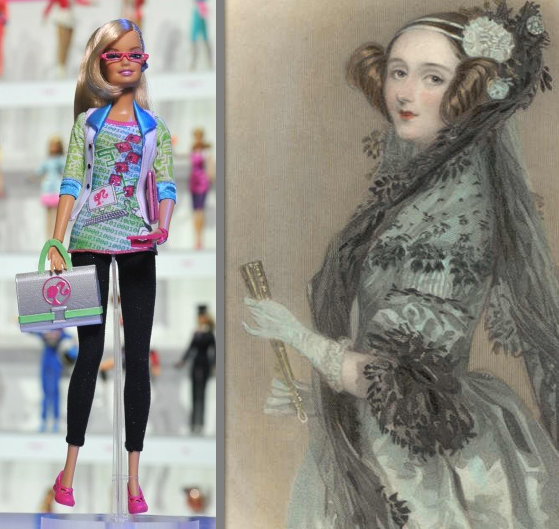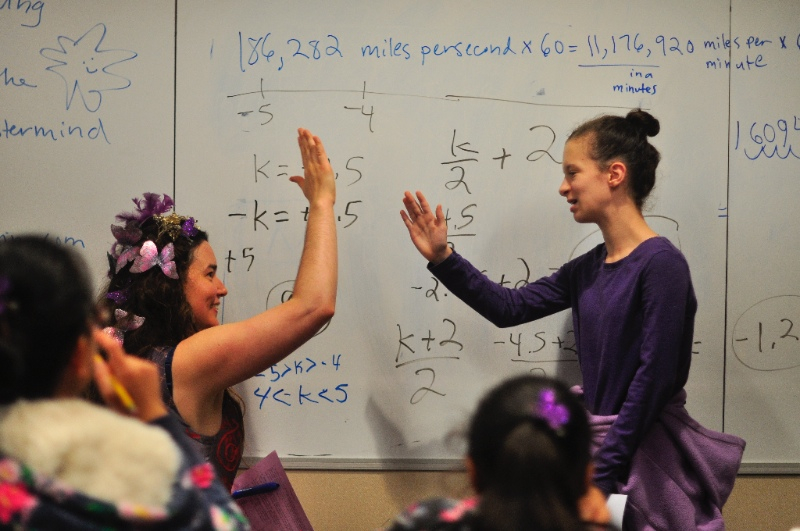Today, I’m guest posting on Mashable about why computer engineer Barbie is good for women in tech. I’m really proud of my article, so feel free to click over and read it in its entirety!
To summarize, critics have attacked the new computer engineer Barbie as being unrealistically feminine. But did you know that the very first computer programmer was a lady? Who wore frilly dresses and elaborate girly hairdos? Aw, yeah… ADA LOVELACE!!

While my article focuses on the controversy surrounding computer engineer Barbie, I want to clarify my main point: everyone (male or female) should feel that they can be themselves while doing math, science, engineering, and technology.
Being Yourself
Many times, when I’m working with my math tutoring students, they’ll spontaneously create an awesome new problem solving technique. A student will stand up and map out an angle with their body by turning a certain number of degrees. Or bust out with new lyrics to Michael Jackson’s “Beat It” in order to remember how even numbers work.
I know that the only reason my students feel free to do these things is because they feel totally comfortable. And they wouldn’t learn as much, or be able to solve problems as well, if they didn’t feel like they could do these things.
When you feel like you can be yourself, it’s easier to ask questions, challenge convention, and come up with intuitive new solutions. Most of all, when you’re comfortable being yourself, you can access everything within you, and you have much greater resources to solve all kinds of problems. If you feel like you have to act a certain way, or need to leave pieces of yourself at the door (maybe the parts that love pink), bits of yourself that could help you solve problems get left behind.
(Not only does this apply to individuals, it also applies to teams working to create products. Pamela Fox points out that one of the signs of a wise crowd is diversity of opinion—when everyone can speak up, even if they’re not in agreement with the majority. Having different kinds of people in computer engineering—or math, or science—makes for stronger products.)
I’m not saying that women must be fashionistas or wear pink or be “feminine,” but that no one should have to choose between being themselves and doing what they love.
Workplace Reality
Female readers with tech careers commented on the pressures women face in male-dominated tech workplaces. Tweeter nostruminc remarked, “Now what the heck is wrong with a pink laptop? NOTHING. But it is intimidating being the only woman in a workplace.”
A friend of mine–an electronic engineer who now engineers solar technology–elaborated: For her, the problem is old-school male-engineer-dominated workplaces combined with American workaholism.
She’s found that when she’s been able to work with more women and the new breed of male engineers who grew up with female engineering classmates, the teams are more fun and more productive. The difference really just lies in the culture of the workplace and how women engineers are treated by their male coworkers.
Stereotypes?
Also, some commenters basically suggested that Barbie, in any form, just perpetuates gender stereotypes: “Boys have Legos, Playmobiles, toy soldiers, trains, workbenches, and astronauts. Girls have princesses, kitchens, sparkly cell phones and baby dolls to push around and practice raising.” But Barbie actually broke the mold. She was one of the first dolls who, as a single career girl, didn’t have to take care of anybody else—or be taken care of.
Additionally, I’m going to speak from personal experience. When I was growing up, my parents didn’t want me to internalize any stereotypes, so they gave me both toy trucks and dolls to play with. But I just wanted to play with dolls. When they gave me both pants and dresses, I only wanted to wear dresses.
Instead of trying to push me to play with trucks and wear pants, they just encouraged me, my whole life, to be myself and follow my passions, however they evolved.
Passion Turbocharges Your Brain
And there’s a neurological basis for my parents’ approach. Po Bronson points out that letting kids follow their passions actually “turbocharges” their brains.
Regardless of our potential moralistic objections to Barbie (or Pokémon), when kids are doing something they love—no matter what it is or whether it has ostensible “educational value”—their brains get spritzed with dopamine, which “depolarizes neurons and improves their firing rate; their response to optimal stimuli becomes sharper, and the background buzz of relevant stimuli is quieted a little.”
Over time, the repetition involved in pursuing your passions assists the myelination process, which increases neural speed “100 fold.” And that’s why Po Bronson is encouraging his 5-year-old daughter’s passion for princesses and Supergirl.
For a great explanation of how passion can change kids’ brains, check out Po Bronson‘s Daily Beast Article about how dumb toys can make kids smarter–in particular, Pokemon. (However, as I learned after corresponding with him after writing this blog post, Pokemon and Computer Engineer Barbie are not parallels, because Barbie does not have something like Pokemon’s extensive taxonomy and math calculation.)
All kinds of Computer Engineers
To those “nay-sayers” who see Barbie as a “devil-doll,” Alison Lewis commented, “Just get the girl coding and making…use it to start a discussion about technology, sit a girl down and do a fun little program, make something with electronics, or talk about other women in tech and how wonderful they are.” Lewis also adds that you can always modify Barbie’s outfit and hair if you don’t like them.
As Pamela Fox points out, “it’s not like I want the next generation of CS [Computer Science] geeks to all wear pink. I just want to get rid of the idea that CS geeks have to like anything in particular—except programming, of course. Ideally, there would be computer programmer Barbies in all flavors—punk goth, prep, jock, nun—and all races and genders.”
Because what does a “real” computer engineer look like? Like whatever you want to wear.
Related Posts:
My Favorite Math Teacher Is a Woman
Tips for How to Help Your Kids with their Math Homework
On being yourself while doing math
On Optimal Challenge
Praise and Intrinsic Motivation–An Answer?












